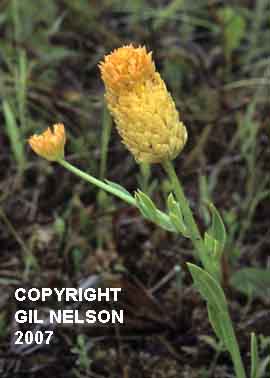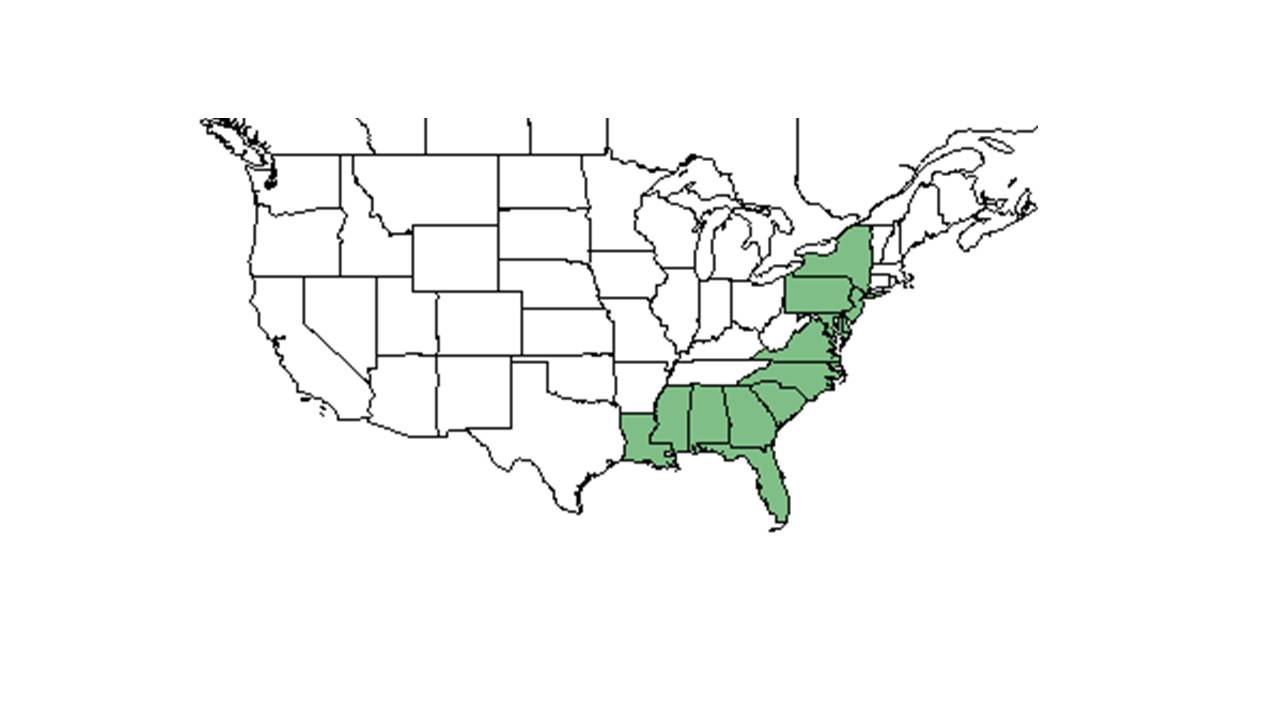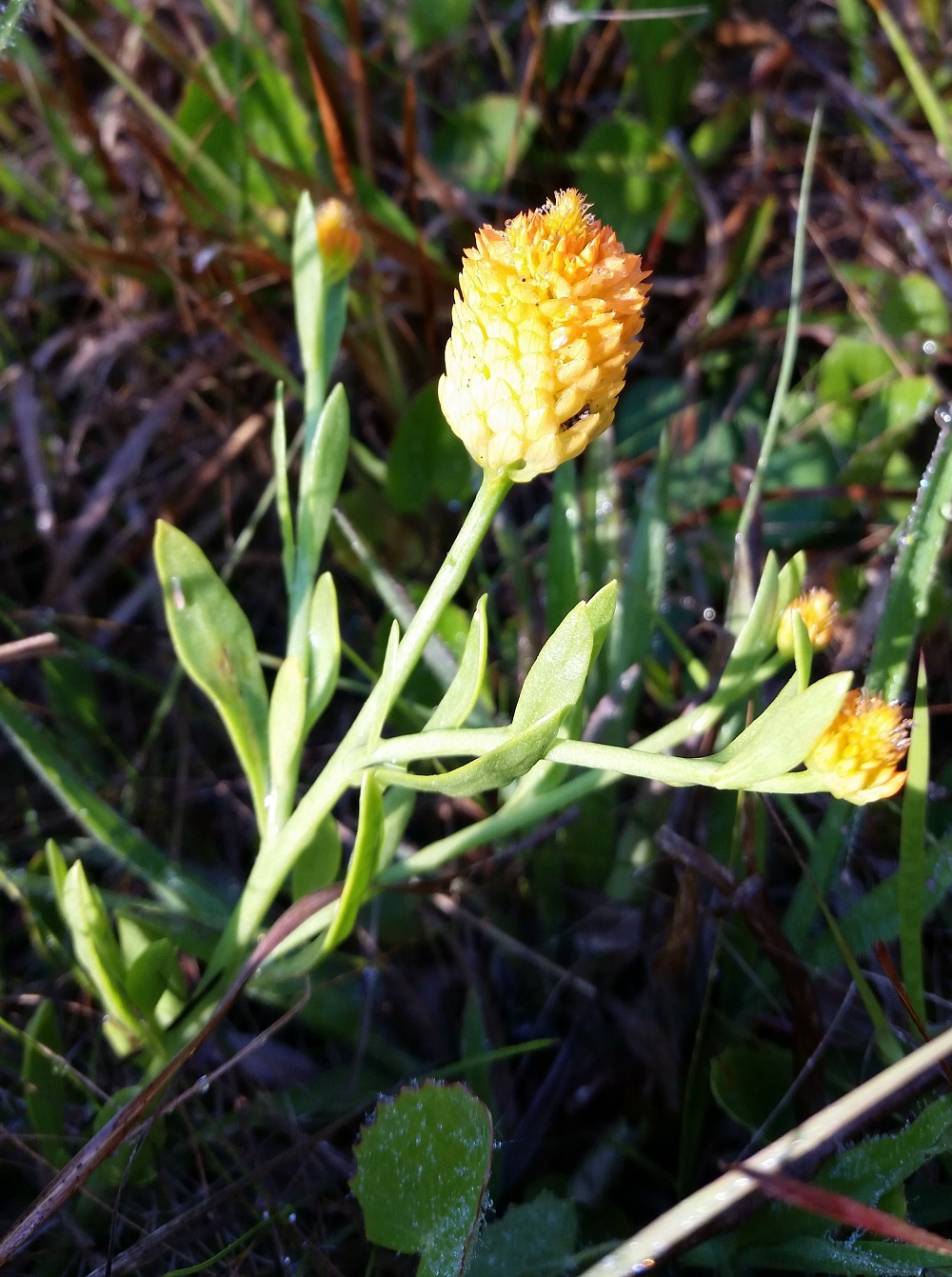Difference between revisions of "Polygala lutea"
(→References and notes) |
(→Taxonomic notes) |
||
| (37 intermediate revisions by 16 users not shown) | |||
| Line 15: | Line 15: | ||
| binomial_authority = L. | | binomial_authority = L. | ||
| range_map = POLY_LUTE_dist.jpg | | range_map = POLY_LUTE_dist.jpg | ||
| − | | range_map_caption = Natural range of ''Polygala lutea'' from USDA NRCS [http:// | + | | range_map_caption = Natural range of ''Polygala lutea'' from USDA NRCS [http://plants.usda.gov/core/profile?symbol=POLU Plants Database]. |
}} | }} | ||
| + | |||
| + | Common names: orange milkwort, red-hot-poker | ||
| + | ==Taxonomic notes== | ||
| + | Synonyms: ''Pilostaxis lutea'' (Linnaeus) Small; ''Pylostachya lutea'' (Linnaeus) Small<ref name=weakley>Weakley, A.S. 2020. Flora of the Southeastern United States. Edition of 20 October 2020. University of North Carolina at Chapel Hill, Chapel Hill, North Carolina.</ref> | ||
| + | |||
| + | Varieties: none<ref name=weakley/> | ||
| + | |||
==Description== | ==Description== | ||
<!-- Basic life history facts such as annual/perrenial, monoecious/dioecious, root morphology, seed type, etc. --> | <!-- Basic life history facts such as annual/perrenial, monoecious/dioecious, root morphology, seed type, etc. --> | ||
| + | "Herbs, whorled or alternate rarely opposite, entire leaves. Flowers lavender, pink, white or yellow, in racemes or spikes, terminating the branches or in terminal corymbs. Flowers perfect, zygomorphic, with 3 small sepals, frequently one of these slightly larger than the others, and 2 larger petaloid sepals (wigs). The 3 petals are united into a tube, 3-lobed at apex, the 2 lateral lobes usually the longer, the center lobe usually lacerate, often thicker in texture; stamens 6-8, united to the corolla tube in 2 rows. Capsule 2 –locular, with one seed in each locule. Seeds dark brown or black, ellipsoid or ovoid, rarely globose, 0.5-3 mm long, usually densely pubescent. The genus has been divided into several genera none of which have distinct characteristics. Orange flowers turn pale yellow on drying, yellow ones bluish green; the pink or lavender ones remain the same color or fade slightly."<ref name="Radford et al 1964">Radford, Albert E., Harry E. Ahles, and C. Ritchie Bell. Manual of the Vascular Flora of the Carolinas. 1964, 1968. The University of North Carolina Press. 658. Print.</ref> | ||
| + | |||
| + | "Glabrous biennial or short-lived perennial with succulent leaves in basal rosettes, stems 1.5-5 dm tall. Leaves oblanceolate to spatulate, stems leaves to 4 cm long, 1 cm wide, reduced upward, the basal leaves often larger. Flowers in compact head-like racemes 1-3.5 cm long, 1.2-2 cm broad, brilliant orange. Sepals 1.2-1.5 mm long, acute, wings elliptic, 5.5-6.5 mm long, acuminate; corolla nearly as long as the wings, fringed; stamens 6. Seeds black, 1-1.3 mm long, densely pubescent; aril 2-lobed, lobes ca. ½ as long as the seed body."<ref name="Radford et al 1964"/> | ||
| + | |||
==Distribution== | ==Distribution== | ||
| − | P. lutea is known to occur in open wet pine savannas | + | ''P. lutea'' is known to occur in open wet pine savannas.<ref name="Hinman and Brewer 2007">Hinman, S. E. and J. S. Brewer (2007). "Responses of two frequently-burned wet pine savannas to an extended period without fire." Journal of the Torrey Botanical Society 134: 512-526.</ref> Observed species in sandhill longleaf pine habitat that has 1 to 3 year fire return intervals, on Pebble Hill Plantation (Michelle M. Smith – early summer 2014 and 2015). |
| + | |||
==Ecology== | ==Ecology== | ||
===Habitat=== <!--Natural communities, human disturbed habitats, topography, hydrology, soils, light, fire regime requirements for removal of competition, etc.--> | ===Habitat=== <!--Natural communities, human disturbed habitats, topography, hydrology, soils, light, fire regime requirements for removal of competition, etc.--> | ||
| + | This species has been found in pine flatwoods, boggy areas, and swamp edges.<ref name="FSU Herbarium">Florida State University Robert K. Godfrey Herbarium database. URL: [http://herbarium.bio.fsu.edu http://herbarium.bio.fsu.edu]. Last accessed: June 2014. Collectors: Loran C. Anderson, Rodie White, R. A. Norris, Robert K. Godfrey, R. Komarek, M. Davis, Cecil R Slaughter, Marc Minno, and Bob Fewster. States and Counties: Florida: Duval, Flagler, Franklin, Osceola, and Wakulla. Georgia: Grady and Thomas.</ref> It has been found in open lit areas in drying, loamy sands as well as wet soils.<ref name="FSU Herbarium"/> This species has also been found growing in human disturbed areas such as along roadsides as well.<ref name="FSU Herbarium"/> | ||
| + | |||
| + | ''P. lutea'' increased its frequency and biomass in response to soil disturbance by clearcutting and chopping in north Florida flatwoods forests. It has shown regrowth in reestablished flatwoods that were disturbed by these practices.<ref>Moore, W.H., B.F. Swindel, and W.S. Terry. (1982). Vegetative Response to Clearcutting and Chopping in a North Florida Flatwoods Forest. Journal of Range Management 35(2):214-218.</ref> | ||
| + | |||
| + | Associated species include longleaf pine, cypress, and wiregrass.<ref name="FSU Herbarium"/> | ||
===Phenology=== <!--Timing off flowering, fruiting, seed dispersal, and environmental triggers. Cite PanFlora website if appropriate: http://www.gilnelson.com/PanFlora/ --> | ===Phenology=== <!--Timing off flowering, fruiting, seed dispersal, and environmental triggers. Cite PanFlora website if appropriate: http://www.gilnelson.com/PanFlora/ --> | ||
| − | ===Seed dispersal=== | + | ''P. lutea'' has been observed flowering in January, from March to July, September, and October with peak inflorescence in April.<ref name="FSU Herbarium"/><ref>Nelson, G. [http://www.gilnelson.com/ PanFlora]: Plant data for the eastern United States with emphasis on the Southeastern Coastal Plains, Florida, and the Florida Panhandle. www.gilnelson.com/PanFlora/ Accessed: 12 DEC 2016</ref> |
| − | ===Seed bank and germination=== | + | <!--===Seed dispersal===--> |
| + | <!--===Seed bank and germination===--> | ||
===Fire ecology=== <!--Fire tolerance, fire dependence, adaptive fire responses--> | ===Fire ecology=== <!--Fire tolerance, fire dependence, adaptive fire responses--> | ||
| − | ===Pollination=== | + | This species is found in annually burned pinelands<ref name="FSU Herbarium"/> such as those of the Wade Tract of south Georgia.<ref>Platt, W.J., R. Carter, G. Nelson, W. Baker, S. Hermann, J. Kane, L. Anderson, M. Smith, K. Robertson. 2021. Unpublished species list of Wade Tract old-growth longleaf pine savanna, Thomasville, Georgia.</ref> |
| − | === | + | <!--===Pollination===--> |
| − | ===Diseases and parasites=== | + | <!--===Herbivory and toxicology===<!--Common herbivores, granivory, insect hosting, poisonous chemicals, allelopathy, etc--> |
| − | ==Conservation and | + | <!--===Diseases and parasites===--> |
| − | == | + | |
| + | ==Conservation, cultivation, and restoration== | ||
| + | |||
| + | ==Cultural use== | ||
==Photo Gallery== | ==Photo Gallery== | ||
| + | <gallery widths=100px> | ||
| + | File:Polygala_lutea_KDSP.jpg|Photo by Katelin Stanley | ||
| + | </gallery> | ||
==References and notes== | ==References and notes== | ||
| − | |||
Latest revision as of 10:33, 14 July 2023
| Polygala lutea | |
|---|---|

| |
| Photo taken by Gil Nelson | |
| Scientific classification | |
| Kingdom: | Plantae |
| Division: | Magnoliophyta – Flowering plants |
| Class: | Magnoliopsida – Dicotyledons |
| Order: | Polygalales |
| Family: | Polygalaceae |
| Genus: | Polygala |
| Species: | P. lutea |
| Binomial name | |
| Polygala lutea L. | |

| |
| Natural range of Polygala lutea from USDA NRCS Plants Database. | |
Common names: orange milkwort, red-hot-poker
Contents
Taxonomic notes
Synonyms: Pilostaxis lutea (Linnaeus) Small; Pylostachya lutea (Linnaeus) Small[1]
Varieties: none[1]
Description
"Herbs, whorled or alternate rarely opposite, entire leaves. Flowers lavender, pink, white or yellow, in racemes or spikes, terminating the branches or in terminal corymbs. Flowers perfect, zygomorphic, with 3 small sepals, frequently one of these slightly larger than the others, and 2 larger petaloid sepals (wigs). The 3 petals are united into a tube, 3-lobed at apex, the 2 lateral lobes usually the longer, the center lobe usually lacerate, often thicker in texture; stamens 6-8, united to the corolla tube in 2 rows. Capsule 2 –locular, with one seed in each locule. Seeds dark brown or black, ellipsoid or ovoid, rarely globose, 0.5-3 mm long, usually densely pubescent. The genus has been divided into several genera none of which have distinct characteristics. Orange flowers turn pale yellow on drying, yellow ones bluish green; the pink or lavender ones remain the same color or fade slightly."[2]
"Glabrous biennial or short-lived perennial with succulent leaves in basal rosettes, stems 1.5-5 dm tall. Leaves oblanceolate to spatulate, stems leaves to 4 cm long, 1 cm wide, reduced upward, the basal leaves often larger. Flowers in compact head-like racemes 1-3.5 cm long, 1.2-2 cm broad, brilliant orange. Sepals 1.2-1.5 mm long, acute, wings elliptic, 5.5-6.5 mm long, acuminate; corolla nearly as long as the wings, fringed; stamens 6. Seeds black, 1-1.3 mm long, densely pubescent; aril 2-lobed, lobes ca. ½ as long as the seed body."[2]
Distribution
P. lutea is known to occur in open wet pine savannas.[3] Observed species in sandhill longleaf pine habitat that has 1 to 3 year fire return intervals, on Pebble Hill Plantation (Michelle M. Smith – early summer 2014 and 2015).
Ecology
Habitat
This species has been found in pine flatwoods, boggy areas, and swamp edges.[4] It has been found in open lit areas in drying, loamy sands as well as wet soils.[4] This species has also been found growing in human disturbed areas such as along roadsides as well.[4]
P. lutea increased its frequency and biomass in response to soil disturbance by clearcutting and chopping in north Florida flatwoods forests. It has shown regrowth in reestablished flatwoods that were disturbed by these practices.[5]
Associated species include longleaf pine, cypress, and wiregrass.[4]
Phenology
P. lutea has been observed flowering in January, from March to July, September, and October with peak inflorescence in April.[4][6]
Fire ecology
This species is found in annually burned pinelands[4] such as those of the Wade Tract of south Georgia.[7]
Conservation, cultivation, and restoration
Cultural use
Photo Gallery
References and notes
- ↑ 1.0 1.1 Weakley, A.S. 2020. Flora of the Southeastern United States. Edition of 20 October 2020. University of North Carolina at Chapel Hill, Chapel Hill, North Carolina.
- ↑ 2.0 2.1 Radford, Albert E., Harry E. Ahles, and C. Ritchie Bell. Manual of the Vascular Flora of the Carolinas. 1964, 1968. The University of North Carolina Press. 658. Print.
- ↑ Hinman, S. E. and J. S. Brewer (2007). "Responses of two frequently-burned wet pine savannas to an extended period without fire." Journal of the Torrey Botanical Society 134: 512-526.
- ↑ 4.0 4.1 4.2 4.3 4.4 4.5 Florida State University Robert K. Godfrey Herbarium database. URL: http://herbarium.bio.fsu.edu. Last accessed: June 2014. Collectors: Loran C. Anderson, Rodie White, R. A. Norris, Robert K. Godfrey, R. Komarek, M. Davis, Cecil R Slaughter, Marc Minno, and Bob Fewster. States and Counties: Florida: Duval, Flagler, Franklin, Osceola, and Wakulla. Georgia: Grady and Thomas.
- ↑ Moore, W.H., B.F. Swindel, and W.S. Terry. (1982). Vegetative Response to Clearcutting and Chopping in a North Florida Flatwoods Forest. Journal of Range Management 35(2):214-218.
- ↑ Nelson, G. PanFlora: Plant data for the eastern United States with emphasis on the Southeastern Coastal Plains, Florida, and the Florida Panhandle. www.gilnelson.com/PanFlora/ Accessed: 12 DEC 2016
- ↑ Platt, W.J., R. Carter, G. Nelson, W. Baker, S. Hermann, J. Kane, L. Anderson, M. Smith, K. Robertson. 2021. Unpublished species list of Wade Tract old-growth longleaf pine savanna, Thomasville, Georgia.
